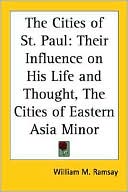 Book review: 1907. Ramsay, the first Professor of Classical Archaeology at Oxford University, pioneered the study of antiquity in what is today known as western Turkey. He went on to devote the latter part of his life to applying what he had learned to the study of the New Testament. He is also acknowledged as the outstanding authority on the life of Paul. This volume is divided into the following parts Paulinism in the Greco-Roman World; Tarsus; Antioch; Iconium; Derbe; Lystra; and St. Paul in the Roman World. See other titles by this author available from Kessinger Publishing.
Book review: 1907. Ramsay, the first Professor of Classical Archaeology at Oxford University, pioneered the study of antiquity in what is today known as western Turkey. He went on to devote the latter part of his life to applying what he had learned to the study of the New Testament. He is also acknowledged as the outstanding authority on the life of Paul. This volume is divided into the following parts Paulinism in the Greco-Roman World; Tarsus; Antioch; Iconium; Derbe; Lystra; and St. Paul in the Roman World. See other titles by this author available from Kessinger Publishing. Book review: 1907. Ramsay, the first Professor of Classical Archaeology at Oxford University, pioneered the study of antiquity in what is today known as western Turkey. He went on to devote the latter part of his life to applying what he had learned to the study of the New Testament. He is also acknowledged as the outstanding authority on the life of Paul. This volume is divided into the following parts Paulinism in the Greco-Roman World; Tarsus; Antioch; Iconium; Derbe; Lystra; and St. Paul in the Roman World. See other titles by this author available from Kessinger Publishing.
Book review: 1907. Ramsay, the first Professor of Classical Archaeology at Oxford University, pioneered the study of antiquity in what is today known as western Turkey. He went on to devote the latter part of his life to applying what he had learned to the study of the New Testament. He is also acknowledged as the outstanding authority on the life of Paul. This volume is divided into the following parts Paulinism in the Greco-Roman World; Tarsus; Antioch; Iconium; Derbe; Lystra; and St. Paul in the Roman World. See other titles by this author available from Kessinger Publishing.